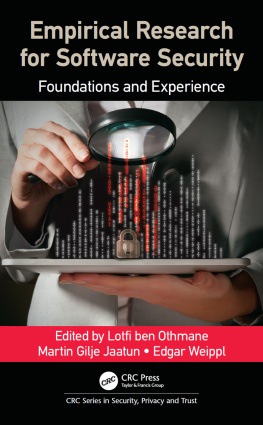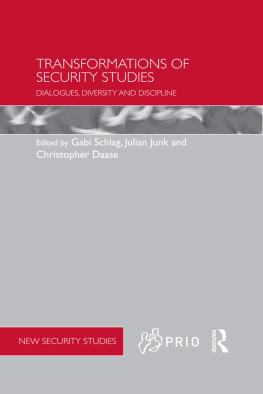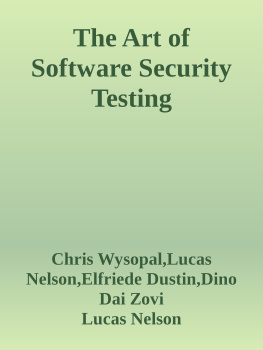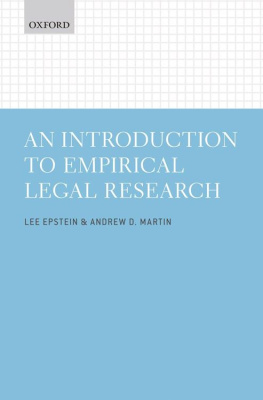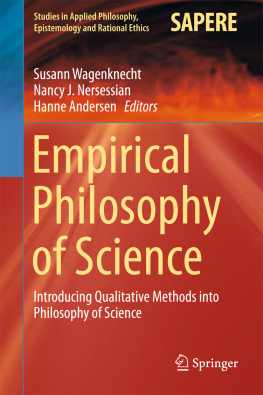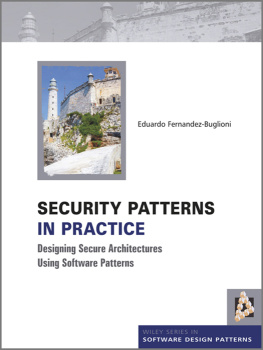ben Othmane Lotfi - Empirical Research for Software Security
Here you can read online ben Othmane Lotfi - Empirical Research for Software Security full text of the book (entire story) in english for free. Download pdf and epub, get meaning, cover and reviews about this ebook. publisher: CRC Press LLC, genre: Politics. Description of the work, (preface) as well as reviews are available. Best literature library LitArk.com created for fans of good reading and offers a wide selection of genres:
Romance novel
Science fiction
Adventure
Detective
Science
History
Home and family
Prose
Art
Politics
Computer
Non-fiction
Religion
Business
Children
Humor
Choose a favorite category and find really read worthwhile books. Enjoy immersion in the world of imagination, feel the emotions of the characters or learn something new for yourself, make an fascinating discovery.
- Book:Empirical Research for Software Security
- Author:
- Publisher:CRC Press LLC
- Genre:
- Rating:3 / 5
- Favourites:Add to favourites
- Your mark:
- 60
- 1
- 2
- 3
- 4
- 5
Empirical Research for Software Security: summary, description and annotation
We offer to read an annotation, description, summary or preface (depends on what the author of the book "Empirical Research for Software Security" wrote himself). If you haven't found the necessary information about the book — write in the comments, we will try to find it.
Empirical Research for Software Security — read online for free the complete book (whole text) full work
Below is the text of the book, divided by pages. System saving the place of the last page read, allows you to conveniently read the book "Empirical Research for Software Security" online for free, without having to search again every time where you left off. Put a bookmark, and you can go to the page where you finished reading at any time.
Font size:
Interval:
Bookmark:

Empirical Research for Software Security
Foundations and Experience
CRC Series in Security, Privacy and Trust
SERIES EDITORS
Jianying Zhou | Pierangela Samarati |
Institute for Infocomm Research, Singapore | Universit degli Studi di Milano, Italy |
AIMS AND SCOPE
This book series presents the advancements in research and technology development in the area of security, privacy, and trust in a systematic and comprehensive manner. The series will provide a reference for defining, reasoning and addressing the security and privacy risks and vulnerabilities in all the IT systems and applications, it will mainly include (but not limited to) aspects below:
Applied Cryptography, Key Management/Recovery, Data and Application Security and Privacy;
Biometrics, Authentication, Authorization, and Identity Management;
Cloud Security, Distributed Systems Security, Smart Grid Security, CPS and IoT Security;
Data Security, Web Security, Network Security, Mobile and Wireless Security;
Privacy Enhancing Technology, Privacy and Anonymity, Trusted and Trustworthy Computing;
Risk Evaluation and Security Certification, Critical Infrastructure Protection;
Security Protocols and Intelligence, Intrusion Detection and Prevention;
Multimedia Security, Software Security, System Security, Trust Model and Management;
Security, Privacy, and Trust in Cloud Environments, Mobile Systems, Social Networks, Peer-to-Peer Systems, Pervasive/Ubiquitous Computing, Data Outsourcing, and Crowdsourcing, etc.
PUBLISHED TITLES
Empirical Research for Software Security: Foundations and Experience
Lotfi ben Othmane, Martin Gilje Jaatun, Edgar Weippl
Intrusion Detection and Prevention for Mobile Ecosystems
Georgios Kambourakis, Asaf Shabtai, Constantinos Kolias, and Dimitrios Damopoulos
Touchless Fingerprint Biometrics
Ruggero Donida Labati, Vincenzo Piuri, and Fabio Scotti
Empirical Research for Software Security: Foundations and Experience
Lotfi ben Othmane, Martin Gilje Jaatun, and Edgar Weippl
Real-World Electronic Voting: Design, Analysis and Deployment
Feng Hao and Peter Y. A. Ryan
Protecting Mobile Networks and Devices: Challenges and Solutions
Weizhi Meng, Xiapu Luo, Steven Furnell, and Jianying Zhou
Location Privacy in Wireless Sensor Networks
Ruben Rios, Javier Lopez, and Jorge Cuellar
Empirical Research for Software Security
Foundations and Experience
Edited by Lotfi ben Othmane
Martin Gilje Jaatun Edgar Weippl

CRC Press
Taylor & Francis Group
6000 Broken Sound Parkway NW, Suite 300
Boca Raton, FL 33487-2742
2018 by Taylor & Francis Group, LLC
CRC Press is an imprint of Taylor & Francis Group, an Informa business
No claim to original U.S. Government works
Printed on acid-free paper
Version Date: 20171024
International Standard Book Number-13: 978-1-4987-7641-7 (Hardback)
This book contains information obtained from authentic and highly regarded sources. Reasonable efforts have been made to publish reliable data and information, but the author and publisher cannot assume responsibility for the validity of all materials or the consequences of their use. The authors and publishers have attempted to trace the copyright holders of all material reproduced in this publication and apologize to copyright holders if permission to publish in this form has not been obtained. If any copyright material has not been acknowledged please write and let us know so we may rectify in any future reprint.
Except as permitted under U.S. Copyright Law, no part of this book may be reprinted, reproduced, transmitted, or utilized in any form by any electronic, mechanical, or other means, now known or hereafter invented, including photocopying, microfilming, and recording, or in any information storage or retrieval system, without written permission from the publishers.
For permission to photocopy or use material electronically from this work, please access www.copyright.com (http://www.copyright.com/) or contact the Copyright Clearance Center, Inc. (CCC), 222 Rosewood Drive, Danvers, MA 01923, 978-750-8400. CCC is a not-for-profit organization that provides licenses and registration for a variety of users. For organizations that have been granted a photocopy license by the CCC, a separate system of payment has been arranged.
Trademark Notice: Product or corporate names may be trademarks or registered trademarks, and are used only for identification and explanation without intent to infringe.
Visit the Taylor & Francis Web site at
http://www.taylorandfrancis.com
and the CRC Press Web site at
http://www.crcpress.com
Contents
Koen Yskout, Kim Wuyts, Dimitri Van Landuyt, Riccardo Scandariato, and Wouter Joosen
Michael Felderer and Jeffrey C. Carver
Lotfi ben Othmane, Achim D. Brucker, Stanislav Dashevskyi, and Peter Tsalovski
Ren Nol, Santiago Matalonga, Gilberto Pedraza, Hernn Astudillo, and Eduardo B. Fernandez
Markus Wagner, Dominik Sacha, Alexander Rind, Fabian Fischer, Robert Luh, Sebastian Schrittwieser, Daniel A. Keim, and Wolfgang Aigner
Natalia Stakhanova and Alvaro A. Cardenas
Martin Gilje Jaatun
Sandra Domenique Ringmann and Hanno Langweg
Robert Bronte, Hossain Shahriar, and Hisham Haddad
Daniela S. Cruzes and Lotfi ben Othmane
The software security field has been plagued by accepted truths or self-evident statements that at their core are based on nothing more than that some guru at one point thought it sounded like a good idea. Consequently, these accepted truths have often proved to be of varying longevity, as fashion changes and new fads emerge. Empirical research allows to test theories in the real world, and to explore relationships, prove theoretical concepts, evaluate models, assess tools and techniques, and establish quality benchmarks across organizations. The methods for doing such research have been used in several areas, such as social sciences, education, and software engineering. These methods are currently being used to investigate software security challenges and mature the subject.
The purpose of this book is to introduce students, practitioners and researchers to the use of empirical methods in software security research. It explains different methods of both primary and secondary empirical research, ranging from surveys and experiments to systematic literature mapping, and provides practical examples.
Rather than a complete textbook on empirical research, this book is intended as a reference work that both explains research methods and shows how software security researchers use empirical methods in their work. With some chapters structured as step-by-step instructions for empirical research and others presenting results of said research, we hope this book will be interesting to a wide range of readers.
In the first chapter, Koen Yskout et al. offer a primer on empirical research in the area of security and privacy by design, explaining what to expect and what not to expect as researcher or reviewer. They address the frequent lack of empirical research on new methods or techniques in the early stages of security and privacy design. Their experience-led chapter discusses how to design and perform controlled experiments and descriptive studies in this domain. It contrasts the methods typically applied by beginning and more experienced researchers with those frequently expected by reviewers, and strikes a balance between scientific rigor and pragmatism dictated by the realities of research.
Font size:
Interval:
Bookmark:
Similar books «Empirical Research for Software Security»
Look at similar books to Empirical Research for Software Security. We have selected literature similar in name and meaning in the hope of providing readers with more options to find new, interesting, not yet read works.
Discussion, reviews of the book Empirical Research for Software Security and just readers' own opinions. Leave your comments, write what you think about the work, its meaning or the main characters. Specify what exactly you liked and what you didn't like, and why you think so.

